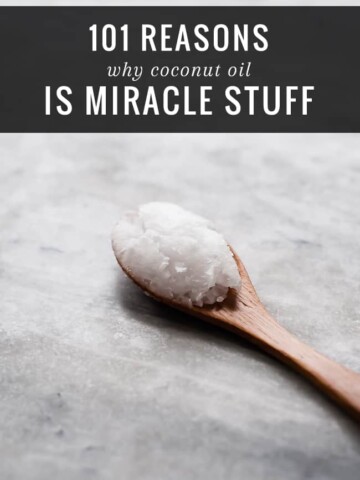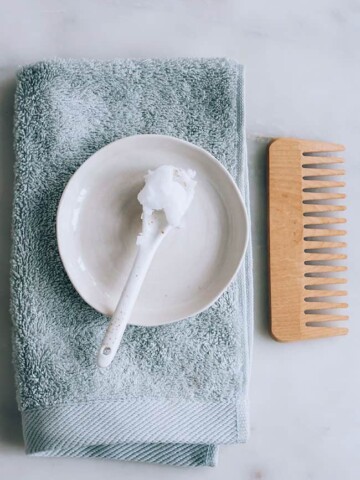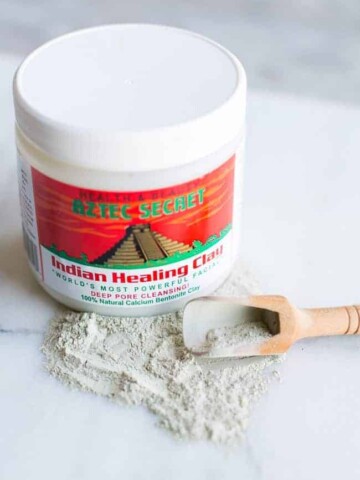The following guide to the best carrier oils for skin is your go-to resource for getting a little more gorgeous every day. No matter what your skin’s needs might be or what type of skin you have, there’s an oil that can help you achieve amazing skin using a bit of nature and very little effort.
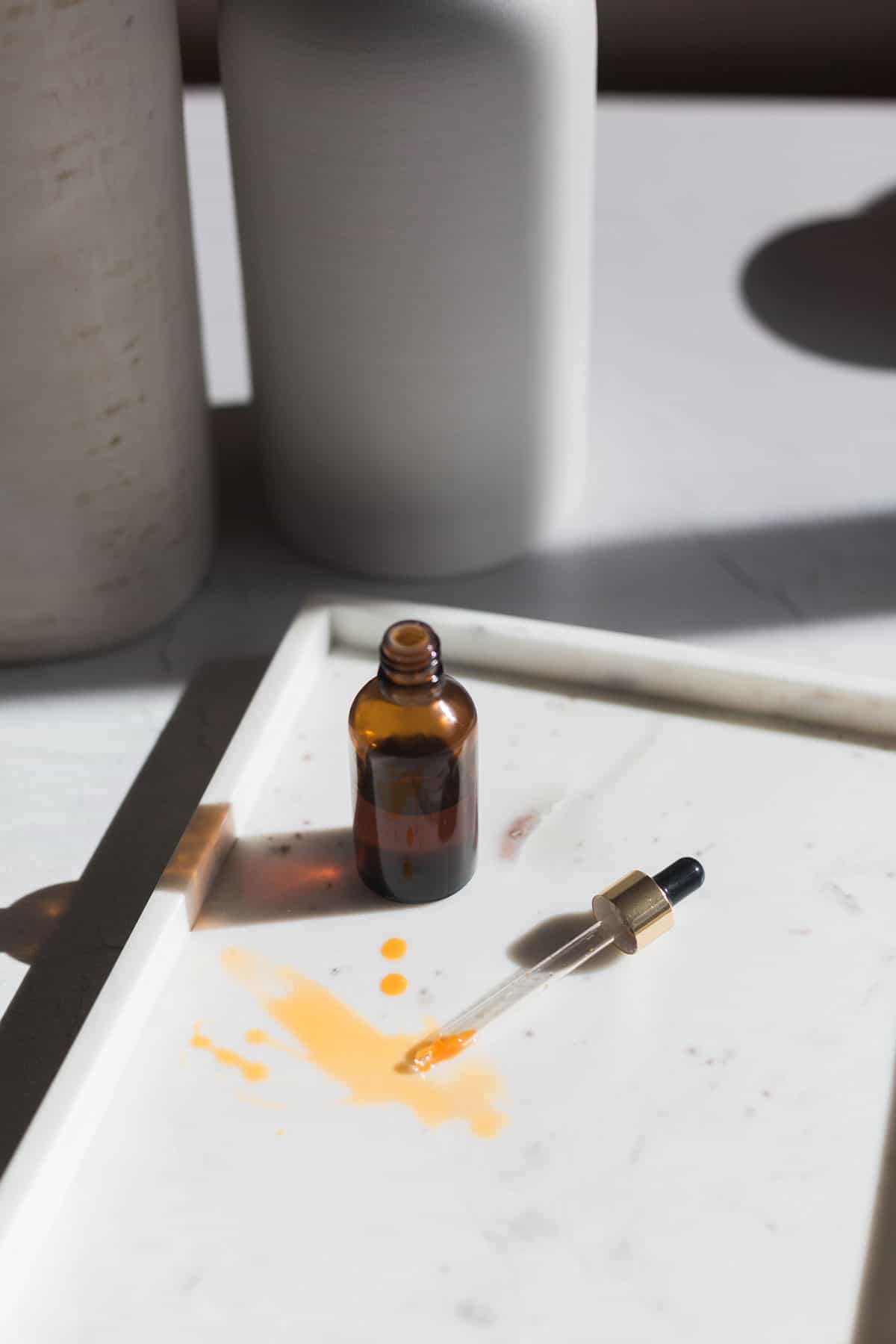
Oils have shed their bad rep, and once again, we can appreciate them for all of their beneficial properties. The oil-free ads once permeating the beauty shelves are being replaced with those touting the positive health effects of using natural oils—it’s just a matter of finding the right oil for your skin.
Check out some of these common carrier oils, and see what works for your skin type. There’s at least one for everyone!
Jump to:
- What Is a Carrier Oil?
- Benefits of Carrier Oils for Skin
- Best Carrier Oils for Oily Skin
- 1. Jojoba Oil
- 2. Tamanu Oil
- 3. Grapeseed Oil
- 4. Hemp Seed Oil
- Best Carrier Oils for Dry Skin
- 5. Sweet Almond Oil
- 6. Coconut Oil
- 7. Sunflower Oil
- 8. Argan Oil
- 9. Olive Oil
- Best Carrier Oils for Aging Skin
- 10. Rosehip Seed Oil
- 11. Evening Primrose Oil
- 12. Sea Buckthorn Oil
- 13. Avocado Oil
- 14. Pomegranate Seed Oil
- 15. Safflower Oil
- 16. Wheat Germ Oil
- References
What Is a Carrier Oil?
Carrier oils are plant-based extracts from nuts and seeds that typically have a mild scent. They can be used alone or mixed with other oils to create multi-purpose combinations.
Most importantly, these carrier oils are naturally derived and lack the fillers and chemicals found in store-bought skincare products. When you buy plant oils, you want to make sure they are cold-pressed. This method of extraction is best for preserving their beneficial qualities [source].
A carrier oil is also commonly used as a base oil to dilute essential oils before they are applied to the skin in aromatherapy and massage. Essential oils are highly concentrated extracts, and carrier oils serve as a neutral base, helping to “carry” the essential oil onto the skin, making it safe for topical use.
Benefits of Carrier Oils for Skin
Essential oils have plenty of skin benefits, but carrier oils deserve recognition for their own skin-nurturing qualities.
- Natural oils can treat, moisturize, protect, and improve your skin.
- They contain multiple beneficial compounds that have antioxidant, antimicrobial, and anti-inflammatory effects when applied to the skin [source].
- Different carrier oils can help certain skin conditions and improve the look and feel of your skin.
- When used properly, they can work to balance oil production, provide anti-aging benefits, and hydrate skin and hair [source].
Here are some of the best carrier oils for face and skin care:
Best Carrier Oils for Oily Skin
1. Jojoba Oil
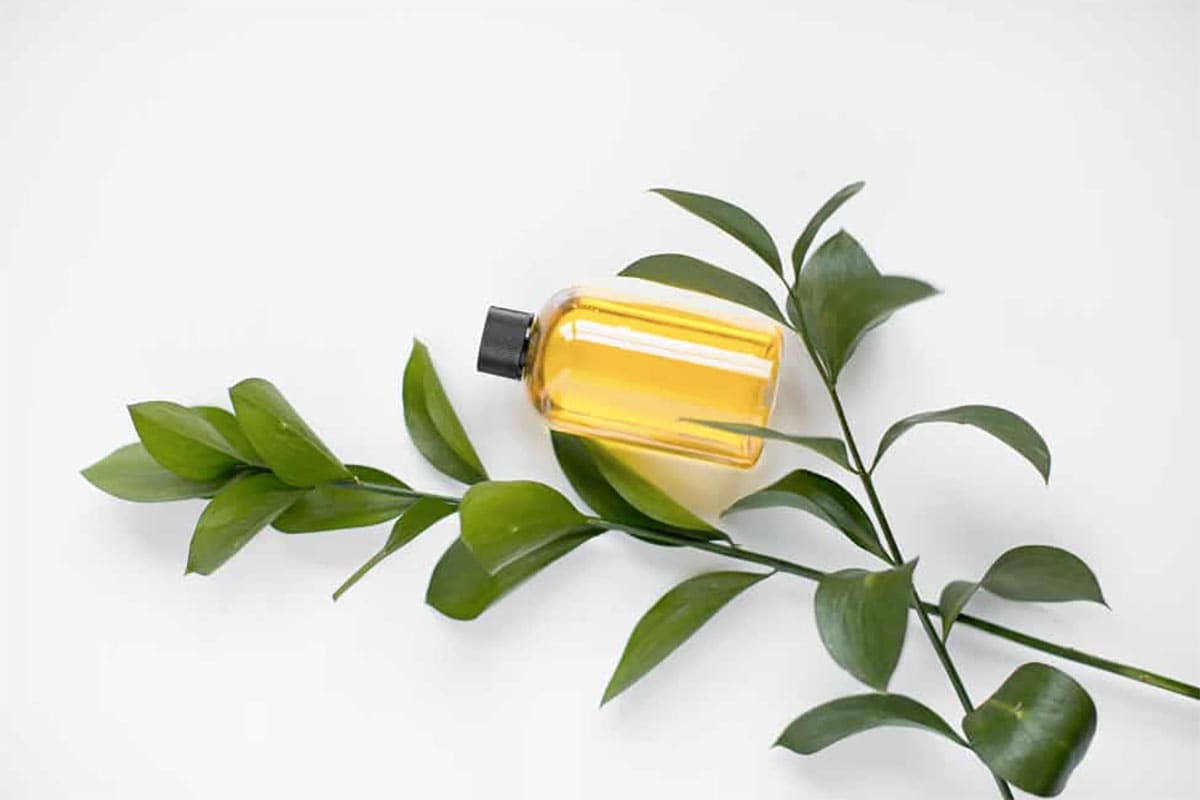
Made from the seeds of the jojoba plant, jojoba oil is one of the most common carrier oils out there, especially since it can be used to help nearly all types of skin. Full of nourishing fatty acids, antioxidants, and vitamin E [source], it’s incredibly moisturizing without leaving a heavy residue.
Jojoba oil works well for combination skin, can be used to nourish dry skin, and even helps oily skin regulate oil production because it mimics your skin’s natural oils. It’s non-greasy, anti-inflammatory, and a natural emollient, helping to maintain a protective skin barrier [source].
There’s nothing like a body balm for your skin, and this recipe with jojoba oil, coconut oil, cocoa butter, and beeswax does just about everything you need.
Buy jojoba oil here.
2. Tamanu Oil
Tamanu oil comes from tamanu nuts and is full of anti-inflammatory, antibacterial, and antioxidant properties. Since it fights bacteria and heals wounds [source], tamanu oil is a great treatment for acne-prone skin.
And, as we know, acne can happen to adults, too. We even have just the right blackhead cleanser for you made with tamanu oil.
Its anti-inflammatory effects make tamanu oil perfect for treating eczema and other skin conditions. Those same properties are also thought to help the appearance of stretch marks and scars.
Buy tamanu oil here.
3. Grapeseed Oil
Grapeseed oil was shown to be an excellent oil regulator. Because it’s loaded with antioxidants and vitamin C, this carrier oil is considered nutrient dense.
Its antimicrobial properties make grapeseed oil especially helpful for those seeing acne in their adult years. It is also said to help restore collagen and calm skin inflammation [source].
This lightweight oil spreads easily, making it a great base for a DIY massage oil.
Buy grapeseed oil here.
4. Hemp Seed Oil
Extracted from the seeds of the hemp plant, this oil is a rich source of omega-3 and omega-6 fatty acids [source], which help it function as a powerful humectant (quenching our thirsty skin!) and soothe inflamed areas.
Hemp seed oil is noncomedogenic, which means it won’t clog pores, making it suitable for all skin types, including oily and acne-prone skin. This oil works to regulate skin oil production and has been helpful in the prevention and treatment of mild acne.
Additionally, it contains antioxidants to prevent aging, and it has anti-inflammatory properties that can soothe irritated skin and promote a more even complexion.
Apply a few drops to clean damp skin, or mix it with your favorite moisturizer. It can also be used as a gentle makeup remover.
Buy hemp seed oil here.
Best Carrier Oils for Dry Skin
5. Sweet Almond Oil
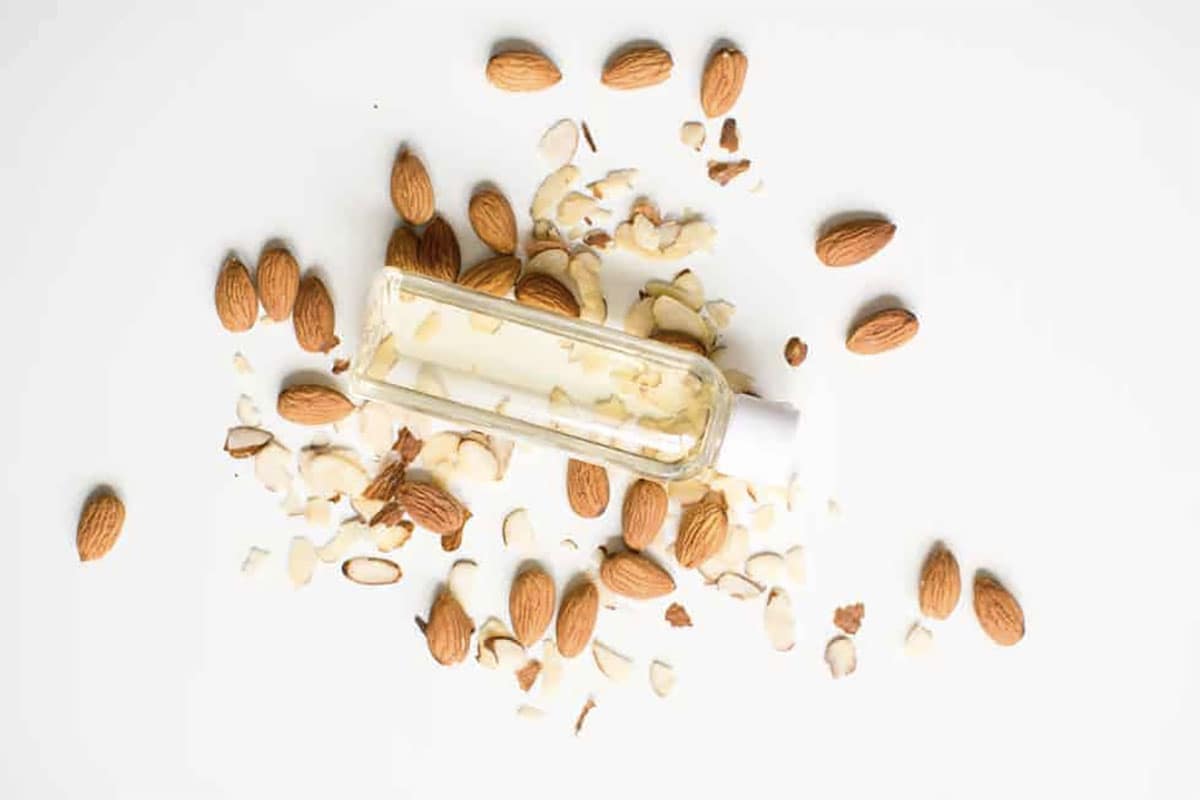
Almonds are certainly a delicious protein snack, but their heavier oil is also nourishing for your dry skin with its richness from vitamin E, fatty acids, proteins, and minerals [source].
Using it as a body oil is a great way to experiment with this oil, especially when you combine it with rose petals. Just add 1 cup of rose petals to 1 cup of almond oil and mix to create a floral-scented, antioxidant-packed, healing body oil.
It’s an extra moisturizing treat for those with very dry or sensitive skin, and its fragrance will ensure that you smell gorgeous, too!
Buy sweet almond oil here.
6. Coconut Oil
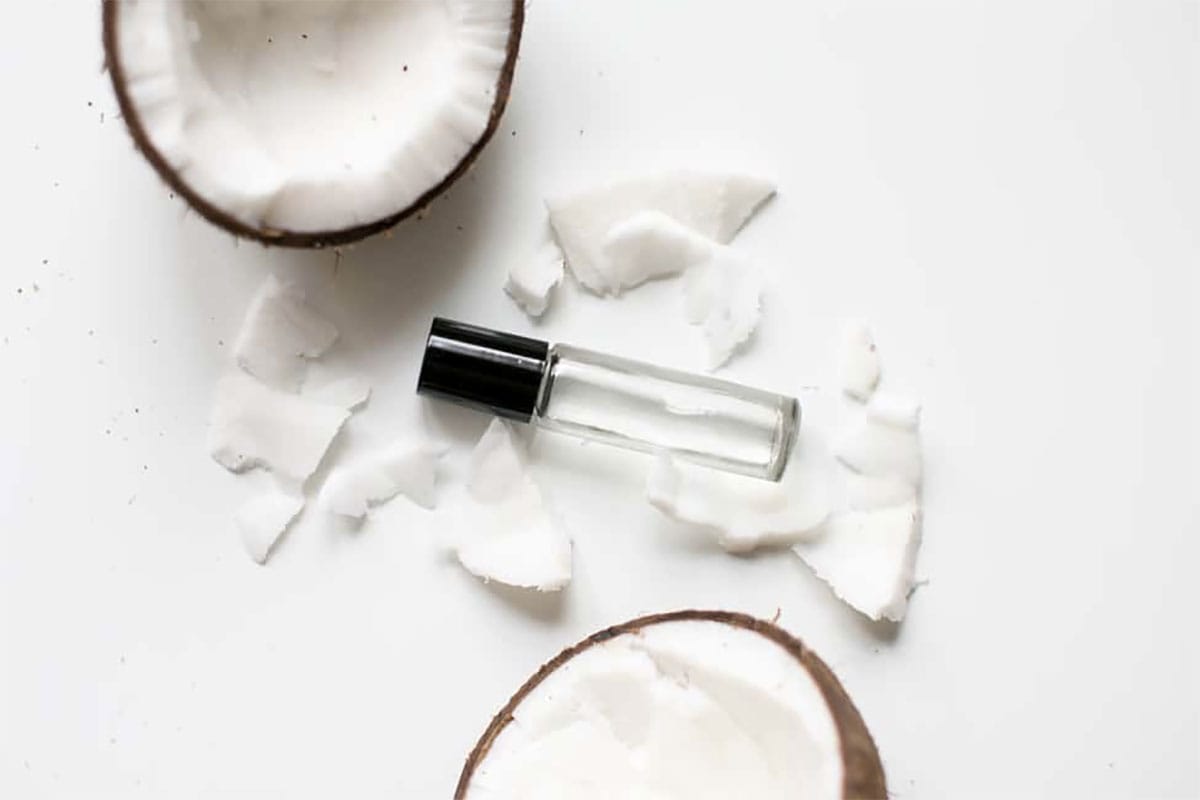
Another great carrier oil for most skin types is organic virgin coconut oil. Rich in vitamin E, antioxidants, and natural fatty acids [source], coconut oil hydrates dry skin from head to toe and fights cellulite, stretch marks, and keratosis pilaris (those pesky bumps on the back of your arms).
It’s true—we love coconut oil. Why? Its various beneficial compounds repair cells, treat inflammation, repel bacteria, and smooth skin [source]. It promotes soft skin and hair, imparting a healthy glow, and it can remove makeup.
Coconut oil is an excellent body moisturizer and has been recommended for dry skin and eczema [source]. Basically, it’s your skin’s best friend.
We have plenty of suggestions for using coconut oil in daily health and beauty routines (101 suggestions, in fact), but here are our 13+ favorite beauty uses for this therapeutic plant oil.
Buy cold-pressed, virgin organic coconut oil here.
7. Sunflower Oil
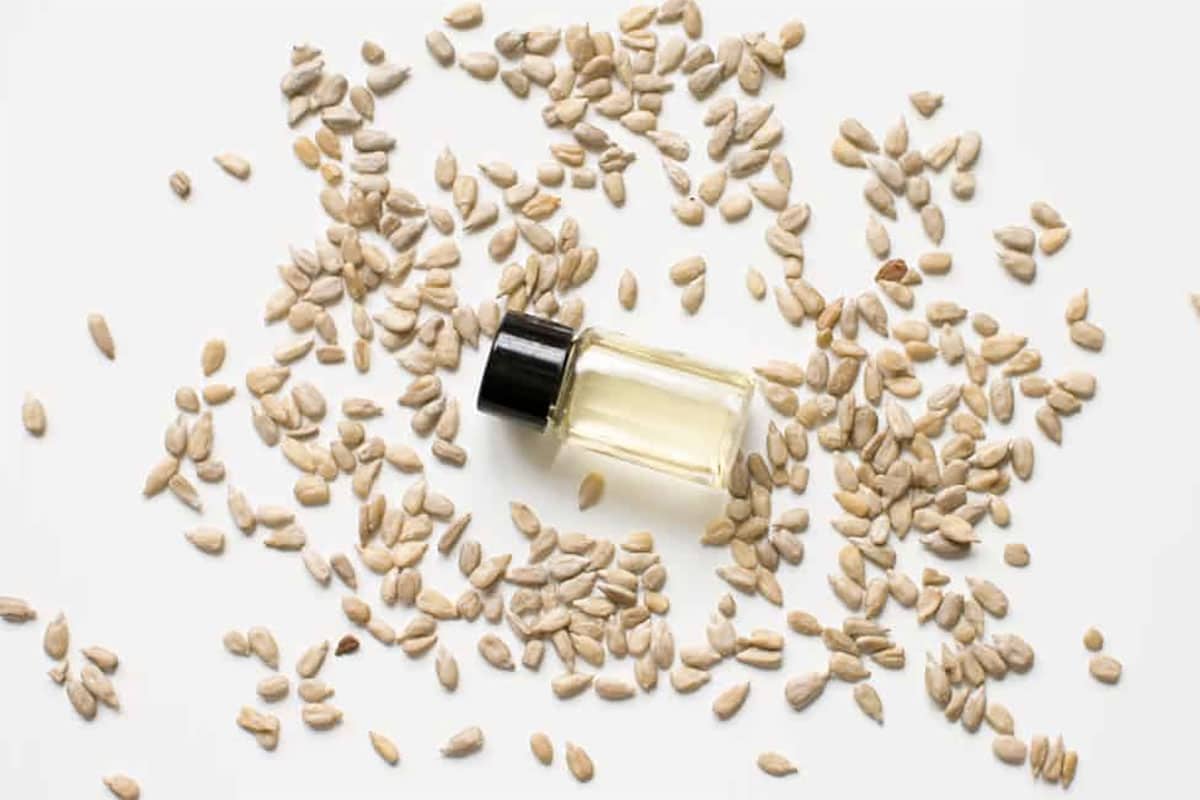
Sunflower oil is known to be a naturally balanced oil—not too heavy or too light. This widely available oil is rich in linoleic acid and promotes skin hydration, minimizing water loss and maintaining the skin’s protective barrier [source]. Rich in vitamins E, A, and C, it has been incorporated into various anti-aging topical products.
Studies have shown that sunflower oil has anti-inflammatory properties and does not damage the skin barrier, so it can be used daily for conditions like eczema [source]. So, if you are dealing with acne or redness and irritation, consider adding this oil to your skincare routine.
It can be used in a variety of ways, including as a post-shower body oil, an anti-aging mask, and for after-sun skin nourishment. This oil can be used alone, or a few drops can be added to your moisturizer.
Buy sunflower oil here.
8. Argan Oil
Used in Northwest Africa as a moisturizer and a cosmetic oil for centuries [source], it has been increasingly popular in the skincare industry because of its wound healing [source] and anti-aging properties despite sparse support by evidence-based studies.
It has been shown to restore some of the skin’s natural hydration [source] and elasticity lost after menopause [source] and may even be used for its anti-melanin action to even out skin tones [source].
Often referred to as liquid gold, argan oil contains high levels of vitamin E, fatty acids, and antioxidant compounds. It promotes healthy collagen, treats acne, and prevents the premature signs of aging.
It’s been used extensively on hair because of its high content of vitamin E and other antioxidants [source].
Buy argan oil here.
9. Olive Oil
Olive oil is high in vitamins A and E, which have anti-aging benefits. Polyphenols, plant compounds that work as powerful antioxidants, anti-inflammatories, and immune enhancers, are found in very high quantities in olive oil [source].
Olive oil works as an intense skin moisturizer, cleanser, and protector. Plus, it helps fight inflammation, prevent skin cancer, and heal some of the effects of sun damage [source].
One caution with the use of olive oil if you have a history of eczema or allergic contact dermatitis: It has been associated with worsening atopic dermatitis [source]. So, if you have an allergic skin condition, talk to your dermatologist before using anything on your skin.
Buy olive oil here.
Best Carrier Oils for Aging Skin
10. Rosehip Seed Oil

Deeply moisturizing, rosehip oil is an amazing option for those looking for a dry skin treatment. Rich and nourishing, it also makes for an excellent anti-aging ingredient, particularly for the dreaded crow’s feet around the eyes.
You’ll see firmer, smoother skin with rosehip oil as its vitamins A, C, and E and antioxidants mediate sun damage and the effects of aging to protect and renew skin [source]. It’s a light oil but not recommended for acne-prone skin.
You can use rosehip oil to make an anti-aging face oil or a hydrating serum with rosewater to use throughout the day.
Buy rosehip seed oil here.
11. Evening Primrose Oil
Have an itch that won’t go away? Try evening primrose oil. It contains a healthy dose of fatty acids and anti-inflammatory properties, and it’s a good option for those dealing with dry, itchy patches from eczema or psoriasis [source].
Bonus: evening primrose oil supplements can help ease your PMS symptoms like bloating, irritability, breast tenderness, and anxiety.
Buy evening primrose oil here.
12. Sea Buckthorn Oil
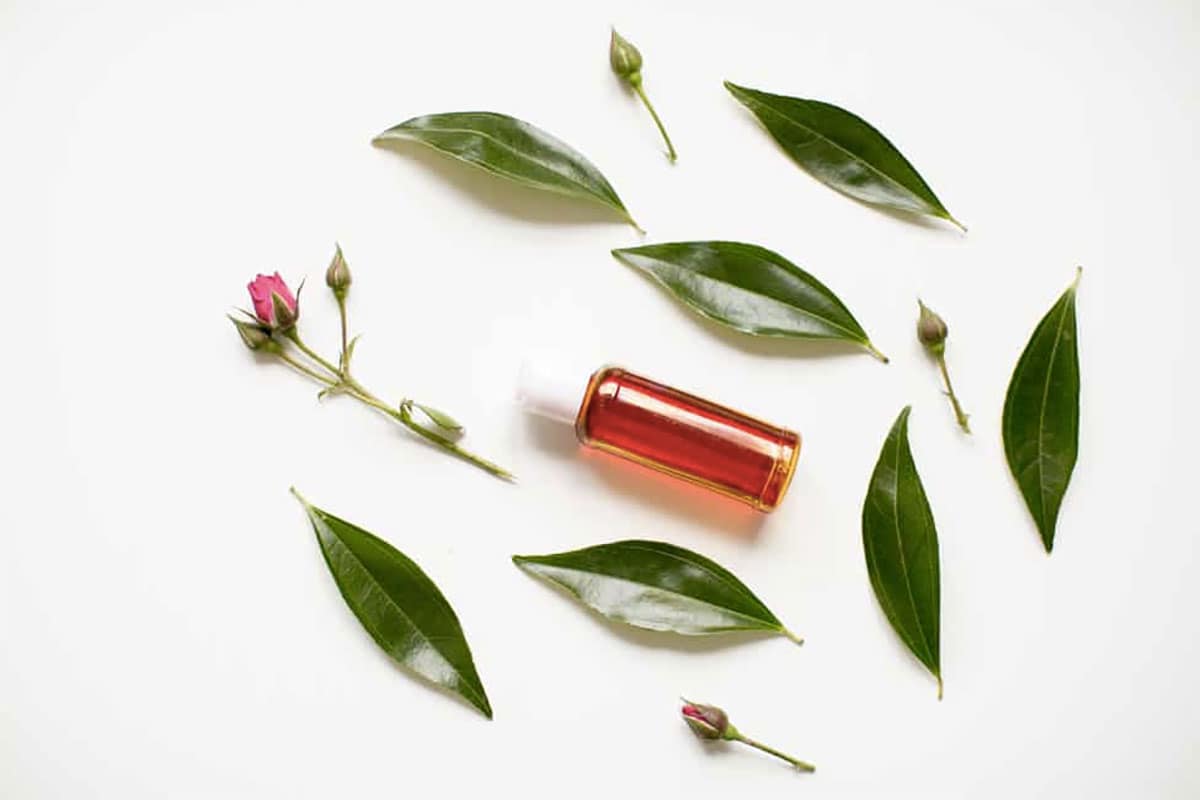
Sea buckthorn is a relatively new trend in the treatment of wrinkles and damaged skin. It’s a great addition to your face moisturizer because it’s packed full of fatty acids, phytosterols, tocopherols, and carotenes [source].
Here’s a recipe to make your own sensitive skin moisturizer, loaded with other beautifiers like shea butter, jojoba oil, and chamomile essential oil.
Buy sea buckthorn oil here.
13. Avocado Oil
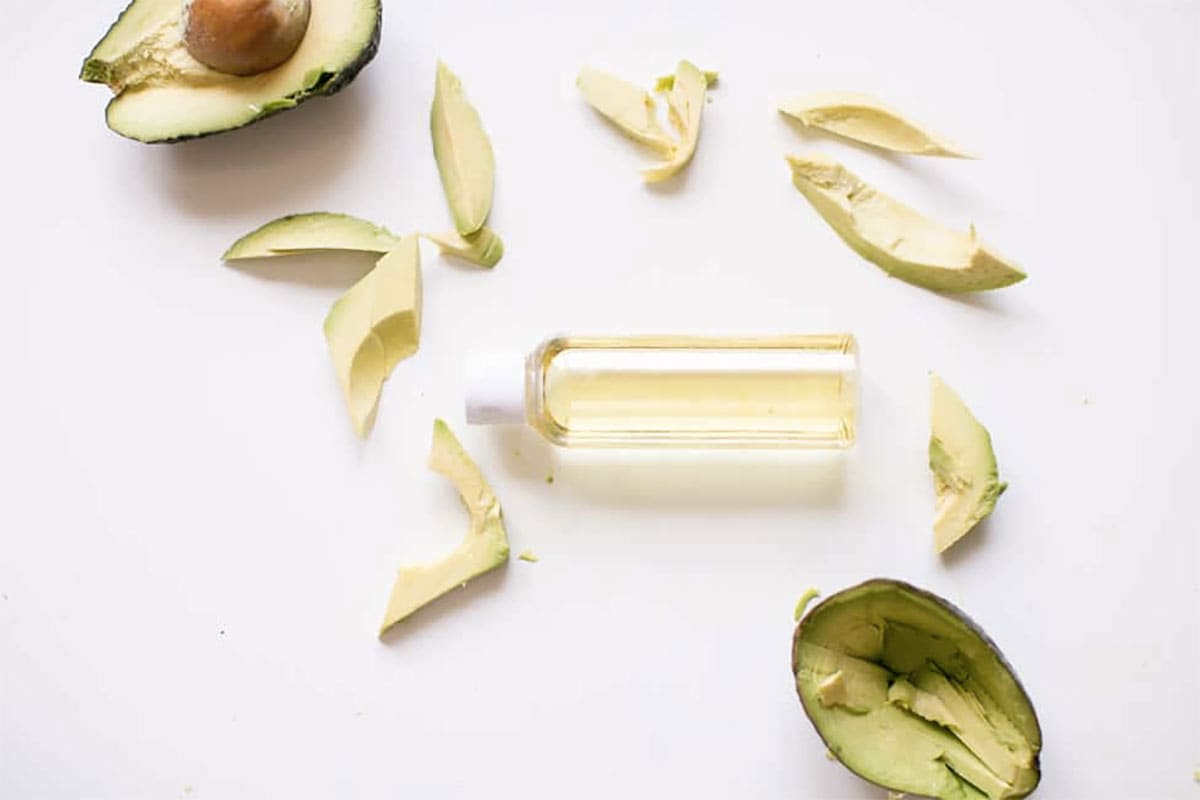
Avocados are a natural source of healthy fatty acids, making avocado oil perfect for moisturizing dry skin [source]. Plus, it contains vitamins A, D, and E that help boost collagen production and fight aging signs like fine wrinkles [source].
Avocado oil increases collagen production [source] and is rich in beta-carotene, lecithin, and vitamins A, D, and E [source]. Among the many other beneficial effects, it moisturizes and fights free radicals that age your skin.
Rich avocado oil keeps the skin supple and promotes elasticity, and it’s also thought to help prevent stretch marks.
Buy cold-pressed avocado oil here.
14. Pomegranate Seed Oil
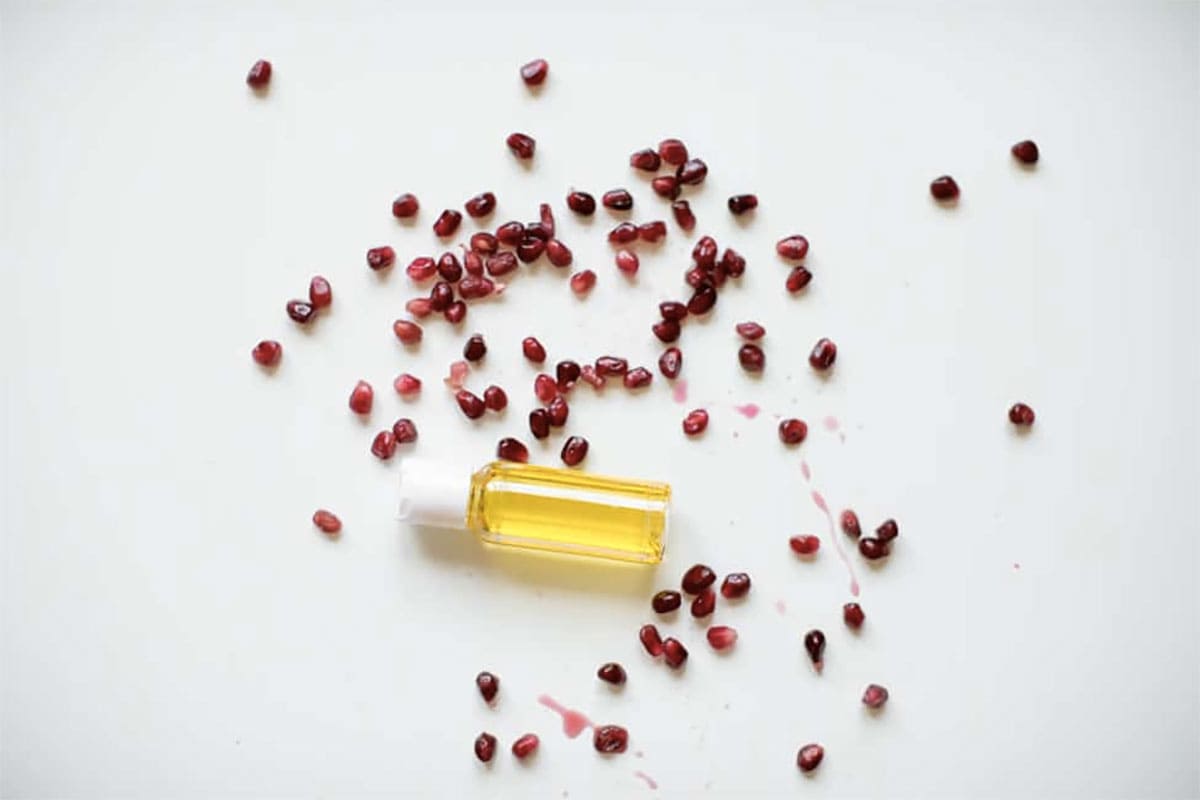
We love pomegranate recipes, and the oil from its seeds is also fabulous for skin. The fruit has been a health staple for thousands of years due to its many benefits. It can reveal younger-looking skin by rejuvenating skin cells and inhibiting UVB damage [source].
This anti-inflammatory oil is protective, contains anti-tumor-promoting properties and antioxidants, and is perfect for all skin types. Try this pomegranate beauty smoothie to start seeing brighter, smoother skin from the inside.
Buy pomegranate seed oil here.
15. Safflower Oil
Rich in essential omega-6 fatty acids, vitamin A, and linoleic acid, safflower oil has been shown to help prevent skin moisture loss and promote cell turnover and renewal. People in parts of Asia have used it for its anti-aging and protective benefits for both skin and hair [source].
Buy safflower oil here.
16. Wheat Germ Oil
Wheat germ oil is a nutrient-rich oil containing vitamins A, B, C, D, and E. It has potent antioxidant and anti-inflammatory power and a generous amount of fatty acids and proteins.
Wheat germ oil is known to have a high concentration of antioxidants and anti-inflammatory compounds [source]. A few studies have shown that oil containing wheat extract oil may help increase skin moisture, improve crow’s feet, and reduce photoaging [source].
Buy wheat germ oil here.
References
References
Vaughn AR, et al. Natural oils for skin-barrier repair: ancient compounds now backed by modern science. Am J Clin Dermatol. 2018.
Lin TK, et al. Anti-inflammatory and skin barrier repair effects of topical application of some plant oils. Int J Mol Sci. 2017.
Al-Obaidi JR, et al. A review on plant importance, biotechnological aspects, and cultivation challenges of jojoba plant. Biol Res. 2017.
Pazyar N, et al. Jojoba in dermatology: a succinct review. G Ital Dermatol Venereol. 2013.
Léguillier T, et al. The wound healing and antibacterial activity of five ethnomedical Calophyllum inophyllum oils: an alternative therapeutic strategy to treat infected wounds. PLoS One. 2015.
Danby SG, et al. Effect of olive and sunflower seed oil on the adult skin barrier: implications for neonatal skin care. Pediatr Dermatol. 2013.
Boateng L, et al. Coconut oil and palm oil’s role in nutrition, health and national development: a review. Ghana Med J. 2016.
Afaq F, et al. Protective effect of pomegranate derived products on UVB-mediated damage in human reconstituted skin. Exp Dermatol. 2009.
Mikulcová V, et al. Formulation, characterization and properties of hemp seed oil and its emulsions. Molecules. 2017.
Melhaoui R, et al. Characterization of sweet almond oil content of four European cultivars (Ferragnes, Ferraduel, Fournat, and Marcona) recently introduced in Morocco. Scientifica (Cairo). 2021.
Lima EBC, et al. Cocos nucifera (L.) (Arecaceae): a phytochemical and pharmacological review. Braz J Med Biol Res. 2015.
Evangelista MTP, et al. The effect of topical virgin coconut oil on SCORAD index, transepidermal water loss, and skin capacitance in mild to moderate pediatric atopic dermatitis: a randomized, double-blind, clinical trial. Int J Dermatol. 2014.
Danby SG, et al. Effect of olive and sunflower seed oil on the adult skin barrier: implications for neonatal skin care. Pediatr Dermatol. 2013.
Villareal MO, et al. Activation of MITF by argan oil leads to the inhibition of the tyrosinase and dopachrome tautomerase expressions in b16 murine melanoma cells. Evid Based Complement Alternat Med. 2013.
Avsar U, et al. The effects of argan oil in second-degree burn wound healing in rats. Ostomy Wound Manage. 2016.
Boucetta KQ, et al. Skin hydration in postmenopausal women: argan oil benefit with oral and/or topical use. Prz Menopauzalny. 2014.
Boucetta KQ, et al. The effect of dietary and/or cosmetic argan oil on postmenopausal skin elasticity. Clin Interv Aging. 2015.
López LC, et al. Argan oil-contained antioxidants for human mitochondria. Nat Prod Commun. 2013.
Gorzynik-Debicka M, et al. Potential health benefits of olive oil and plant polyphenols. Int J Mol Sci. 2018.
Budiyanto A, et al. Protective effect of topically applied olive oil against photocarcinogenesis following UVB exposure of mice. Carcinogenesis. 2000.
Marmol I, et al. Therapeutic applications of rose hips from different Rosa species. Int J Mol Sci. 2017.
Korać RR, et al. Potential of herbs in skin protection from ultraviolet radiation. Pharmacogn Rev. 2011.
Zielińska A, et al. Abundance of active ingredients in sea-buckthorn oil. Lipids Health Dis. 2017.
Bhuyan DJ, et al. The odyssey of bioactive compounds in avocado (Persea americana) and their health benefits. Antioxidants (Basel). 2019.
Flores M, et al. Avocado oil: characteristics, properties, and applications. Molecules. 2019.
De Oliveira AP, et al. Effect of semisolid formulation of Persea Americana Mill (avocado) oil on wound healing in rats. Evid Based Complement Alternat Med. 2013.
Afaq F, et al. Protective effect of pomegranate derived products on UVB-mediated damage in human reconstituted skin. Exp Dermatol. 2009.
Jeong EH, et al. Safflower seed oil and its active compound acacetin inhibit UVB-induced skin photoaging. J Microbiol Biotechnol. 2020.
Zargar S, et al. An Insight into wheat germ oil nutrition, identification of its bioactive constituents and computer-aided multidimensional data analysis of its potential anti-inflammatory effect via molecular connections. Life (Basel). 2023.
Costa EF, et al. Recent advances in herbal-derived products with skin anti-aging properties and cosmetic applications. Molecules. 2022.
This post was medically reviewed by Dr. Jennifer Haley, a board-certified dermatologist with extensive experience in medical, cosmetic, and surgical dermatology. Learn more about Hello Glow’s medical reviewers here. As always, this is not personal medical advice, and we recommend that you talk with your doctor.
604
